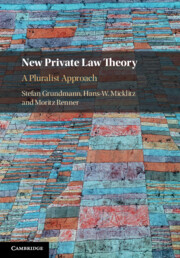'Private law tends to suffer, notoriously, both from an identity problem (what exactly is private about private law?) and a form of tunnel-vision (its stakes are merely technical) that disqualifies it as irrelevant in the ‘age of the post’. This may be why the most vital contemporary issues, from climate change to financial markets, are entrusted to public-style regulation. This book is a timely proposal to inject interdisciplinarity, pluralism and critical thinking into a ‘new private law’. After so much of the world’s human and natural resources have been extracted with the often invisible complicity of the ‘old’ private law, such a move may prove crucial now for the constitution of law’s moral economy.'
Horatia Muir Watt - Professor at Ecole de droit, Sciences-po
'The treatise of Grundmann, Micklitz and Renner contains the first comprehensive discussion of American and European essays which have influenced and continue to influence legal thinking. It juxtaposes, at times radically different, theories which prompts one to reflect on what ultimately counts in private law theory. Whatever one’s theoretical position is, one will find inspiration in this book.'
Lorenz Kähler - Lehrstuhl für Bürgerliches Recht, Zivilprozessrecht und Rechtsphilosophie, Universität Bremen
'Private law can no longer be the 'law of the market' as it was in its formalist heyday. It must evolve in response to the multiple risks, verging on the existential, which our current model of social and economic organisation is generating. New Private Law Theory is a response to this challenge. As set out in this major work, it is pluralist, comparative and interdisciplinary, while retaining a close focus on the interpretive core of legal method. This is the applied private law theory we need for our times.'
Simon Deakin - Professor of Law, University of Cambridge
'New Private Law Theory is an astonishingly wide-ranging and perceptive book, which applies a vast array of methods - from Guido Calabresi’s economics through Niklas Luhman’s social theory to Michel Foucault’s philosophy - to an equally broad set of concrete legal cases - from products liability through loan contracts to sports arbitration. Throughout, the book simply brims with insights and ideas. It will open the eyes of law students and reinvigorate the thinking of established scholars.'
Daniel Markovits - Guido Calabresi Professor of Law, Yale Law School



